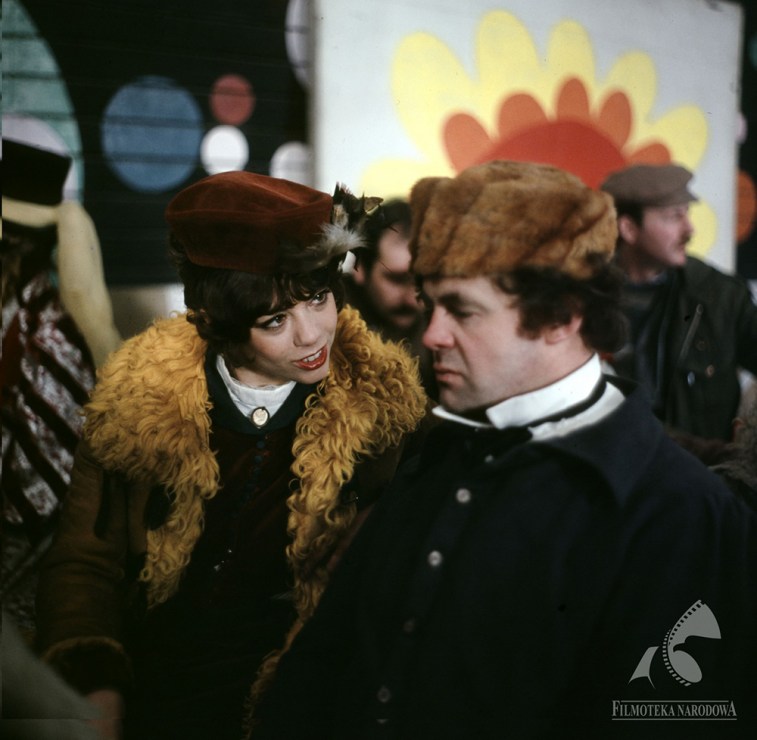The film is often referred to as a loose string of sketches yet the plot in Bareja’s work is truly elaborate. The starting point is a problem with a passport – a document that was subject to extreme control by the regime's authorities during the communist era in Poland.
When the president of the ‘Tęcza’ sports club (Polish for ‘rainbow’), Ryszard Ochódzki (Stanisław Tym), attempts to cross the border together with a team of sportsmen, he is denied passage and kept in the country because his passport is missing a few pages. The protagonist has no doubts that his ex-wife, Irena (Barbara Burska), is responsible for the situation and is trying to prevent him from leaving Poland. The woman does not want to let Ochódzki reach London and empty an account that they opened together years back.
To reach the money before his ex-wife does, Ochódzki decides to find a lookalike who could go to England instead of him. Thanks to the help of a film producer known for his poor pseudo-patriotic works, Jan Hochwander (Krzysztof Kowalewski), Ochódzki manages to find an appropriate candidate: Stanisław Paluch (also played by Stanisław Tym), a simple charcoal burner who, except for his luxuriant hair, looks exactly the same as the president of the sports club. Paluch is to be seduced by Aleksandra (Christine Paul-Podlasky), an aspiring actress to whom Ochódzki promised a role in the film of Roman Polański in exchange…
The plot of Bareja’s comedy is complemented by a series of film sketches in which vibrant characters appear: the amateur artist ‘wesoły Romek’ (editor’s translation: cheerful Romek) or ‘Wujek Dobra Rada’ (Agony Uncle), namely Lieutenant Lech Ryś of the Milicja Obywatelska (Citizens' Militia – the national police during the communist regime in Poland). These short scenes, peripheral to the storyline as such, contain a satirical image of life under the regime. It is a world where cutlery is chained to tables in milk bars, newsagents illegally sell meat that they keep hidden under the counter (editor’s note: during the communist regime, many goods were regulated and food coupons limited the amount one could buy, which gave rise to a black market, often manifesting itself in quite unusual ways), and at the Warsaw airport there is a sign saying that the closest viewing balcony is located in Wrocław – a city nearly 400 kilometres away.
 Still from Teddy Bear, dir. by Stanisław Bareja, pictured: Christine Paul-Podlasky & Stanisław Tym, photo: Studio Filmowe Zebra / Filmoteka Narodowa / www.fototeka.fn.org.pl
Still from Teddy Bear, dir. by Stanisław Bareja, pictured: Christine Paul-Podlasky & Stanisław Tym, photo: Studio Filmowe Zebra / Filmoteka Narodowa / www.fototeka.fn.org.plThe titular teddy bear – an ugly straw effigy hoisted over Warsaw by a helicopter for reasons unknown – can be treated as a symbol of the dullness and absurdity of the communist era in Poland. Admittedly, Bareja considerably augments the inanity of that time but his nearly surrealist vision is strongly based on the social reality of the period. The director ridicules everyone and everything – the idiocy of policemen, the conformity of artists, or the ubiquitous cunningness. What the satire hides is a bitter reflection – the citizens of the Polish People’s Republic were living in a haphazard world out of joint. It is no coincidence that the word ‘tradition’ incessantly recurs in the dialogues, and none of the main characters seems to be able to define it. A quality that might give some sense to the community is missing – the director seems to be saying in the finale – because true tradition has been replaced by artificially-constructed ‘new secular traditions’.
The strong link between the plot of Teddy Bear and a very particular political reality may make the comedy seem quite incomprehensible for viewers outside Poland or even younger generations of Poles. However, Bareja’s movie is not merely a portrayal of a historical moment. Some aspects of the satire, like mocking cajolery, hypocrisy or deceitfulness, remain up-to-date. The continuations of the film's universe can serve as proof – in 1991, Sylwester Chęciński made Calls Controlled about Ryszard Ochódzki’s adventures during the martial law period in Poland, and in 2007, Stanisław Tym shot Richie, a film about him set in contemporary times. Even though the former was quite good, none of the directors were able to equal Bareja’s work which still remains paragon.
Teddy Bear (Miś), Poland, 1980. Directed by Stanisław Bareja, script by Stanisław Bareja and Stanisław Tym. Cinematography by Zdzisław Kaczmarek. Set design by Halina Dobrowolska. Score by Jerzy Derfel. Performed by Stanisław Tym (Ryszard Ochódzki, Stanisław Paluch), Krzysztof Kowalewski (Jan Hochwander), Bronisław Pawlik (employee in ‘Tęcza’ sports club), Christine Paul-Podlasky (Aleksandra), Barbara Burska (Irena Ochódzka), Jerzy Turek (Wacław Jarząbek), and others.
Produced by Studio Filmowe Zebra. Colour, 111 minutes.
Originally written in Polish by Robert Birkholc, June 2017, translated by NS, July 2017.